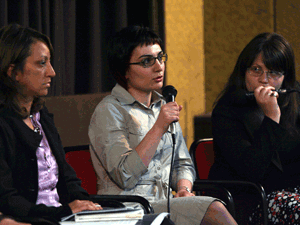Nona Salaghaia
 The war is launched by great people and small people are sacrificed in it. UN observer Peter Nikolas called city of Gori the city of Ghosts. Foreign experts continuously report about the bombed and destroyed buildings, ten thousands of homeless people; wounded people need medical treatment, dead people shall be buried, the hostages are looking forward to freedom…
The war is launched by great people and small people are sacrificed in it. UN observer Peter Nikolas called city of Gori the city of Ghosts. Foreign experts continuously report about the bombed and destroyed buildings, ten thousands of homeless people; wounded people need medical treatment, dead people shall be buried, the hostages are looking forward to freedom…
Although the tense relationship between Russia and Georgia had been widely discussed before the war, the break out of the war was surprise not only for the population but for politicians too. Suddenly escalated situation shocked the population and people could not control their action. Nothing is more astonishing to see than crazy faces of people in the bombed and destroyed city.
The Human Rights Center made a film “KNO3 – Black Gun Powder” where people sacrificed in the war come together. It is impossible not to be shocked by the prologue of the film where the mother of the killed man is moaning over the grave of her son. It is impossible to look into the eyes of the respondents of Nino Gvedashvili, film-director and not to ask: Was it really impossible to avoid this war? Was it really necessary to sacrifice so many people? Was the reintegration of lost territories worth to have so many people killed and internally displaced?
Documentary film “KNO3” does not blame anyone; only the victims are interviewed in it. It is much easy to find victims in the city soon after the war: people standing in front of the building of municipality board waiting for humanitarian aid; 25-26 year old boy who is looking for his father who was taken hostage by Ossetian people; pregnant woman who sleeps on the bed without mattress in the tent directly … they tell us about their own problems - what they had personally witnessed and endured. There is nothing false in this film. With the background of the destroyed city we can see the real life of the people who were left without hope; the film that lasts 35 minutes takes the breath of audience.
“We decided to make a film as suddenly as the war broke out in our lives,” said the author of the film, “Since the Human Rights Center deiced to document the ongoing situation we considered that video-recording of the facts would be most effective way to demonstrate everything.”
The Human Rights Center recorded 14 cassettes in total but of course the complaints of all respondents could not be shown in 35-minute-film. However, as the author said there were people who had huge problems but did not want to speak about it in front of camera. Some of them were afraid of being killed if they spoke up and others had lost hope of being helped.
“Our aim was to tell the society what our respondents could not say publicly. We wanted to destroy the attractive picture that was created by national TV Channels during the war and afterwards; their stories were far from reality,” said Nino Gvedashvili.
The Human Rights Center presented the film in the small hall of the Cinema House. Ucha Nanuashvili, executive director of the Center said he wants wider society to see this film. However, he does not think that national TV Channels will show this film because the stories told in the film are not acceptable for the government. “Nevertheless, we will inform the national TV Channels about the film but I am sure they will not show it. Fortunately, there are several independent TV Channels that can show this film. Besides that, we will post the film on several websites and people will see it,” said Ucha Nanuashvili.



